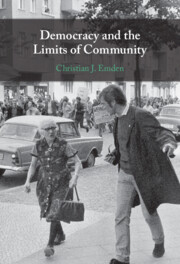Refine listing
Actions for selected content:
1299955 results in Books

Sign Language Linguistics
- Exploring BSL and ASL
- Coming soon
-
- Expected online publication date:
- March 2026
- Print publication:
- 31 March 2026
-
- Textbook
- Export citation

The History of European Union Law
- Constitutional Practice, 1950 to 1993
- Coming soon
-
- Expected online publication date:
- March 2026
- Print publication:
- 31 March 2026
-
- Book
- Export citation

The Resilience of the Old Regime
- Paths Around Democracy in Europe, 1832–1919
- Coming soon
-
- Expected online publication date:
- March 2026
- Print publication:
- 31 March 2026
-
- Book
- Export citation

Identifying Non-International Armed Conflict
- International Law and Practice
- Coming soon
-
- Expected online publication date:
- March 2026
- Print publication:
- 31 March 2026
-
- Book
- Export citation

Democracy and the Limits of Community
- Coming soon
-
- Expected online publication date:
- March 2026
- Print publication:
- 31 March 2026
-
- Book
- Export citation

Defending Democracy
- Citizenship as a Vocation
- Coming soon
-
- Expected online publication date:
- March 2026
- Print publication:
- 31 March 2026
-
- Book
- Export citation
Flow Cytometry in Hematolymphoid Neoplasms
- A Comprehensive and Practical Guide to Diagnosis
- Coming soon
-
- Expected online publication date:
- March 2026
- Print publication:
- 31 March 2026
-
- Book
- Export citation

Colour Concepts from a Linguistic and Literary Perspective
- Coming soon
-
- Expected online publication date:
- March 2026
- Print publication:
- 31 March 2026
-
- Element
- Export citation

Teaching Shakespeare's Emotions
- Coming soon
-
- Expected online publication date:
- March 2026
- Print publication:
- 31 March 2026
-
- Element
- Export citation

Speech Technology
- A Theoretical and Practical Introduction
- Coming soon
-
- Expected online publication date:
- March 2026
- Print publication:
- 31 March 2026
-
- Textbook
- Export citation
Urban Revolution
- People's Communes in Beijing
- Coming soon
-
- Expected online publication date:
- March 2026
- Print publication:
- 31 March 2026
-
- Book
- Export citation

Language, Gender and Biopolitics
- Meaning-Making and Intersex Variations in Healthcare
- Coming soon
-
- Expected online publication date:
- March 2026
- Print publication:
- 31 March 2026
-
- Element
- Export citation

Legislating Peace
- How Gender Diverse Rebel Parties Encourage the Implementation of Gender Peace Agreement Provisions
- Coming soon
-
- Expected online publication date:
- March 2026
- Print publication:
- 31 March 2026
-
- Element
- Export citation

Outdoor Singing in Modern Britain
- A Sensory and Emotional History
- Coming soon
-
- Expected online publication date:
- March 2026
- Print publication:
- 31 March 2026
-
- Element
- Export citation

Building an Air Force
- The Air Corps and the Formation of US Airpower
- Coming soon
-
- Expected online publication date:
- March 2026
- Print publication:
- 31 March 2026
-
- Book
- Export citation
Where's Coase?
- The Implications of Economic Property Rights or Rent-Seeking in Forming Institutions
- Coming soon
-
- Expected online publication date:
- March 2026
- Print publication:
- 31 March 2026
-
- Book
- Export citation

Constrained Multilingualism
- Coming soon
-
- Expected online publication date:
- March 2026
- Print publication:
- 31 March 2026
-
- Element
- Export citation

The Great Palace
- Coming soon
-
- Expected online publication date:
- March 2026
- Print publication:
- 31 March 2026
-
- Element
- Export citation

Understanding Modern Warfare
- Coming soon
-
- Expected online publication date:
- March 2026
- Print publication:
- 31 March 2026
-
- Textbook
- Export citation
The Neuroscience of Word Meaning
- Coming soon
-
- Expected online publication date:
- March 2026
- Print publication:
- 28 February 2026
-
- Book
- Export citation
